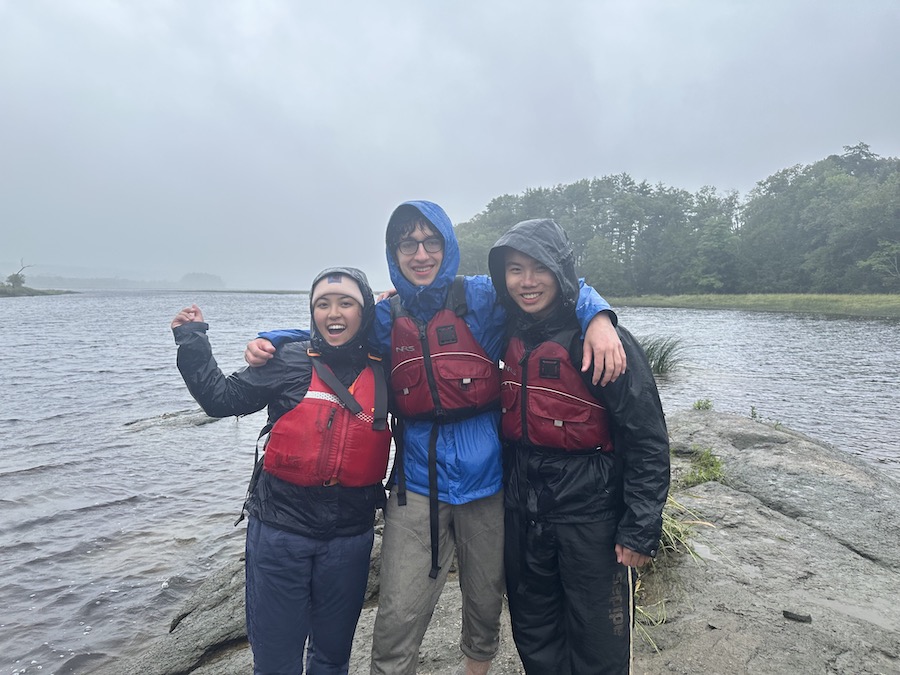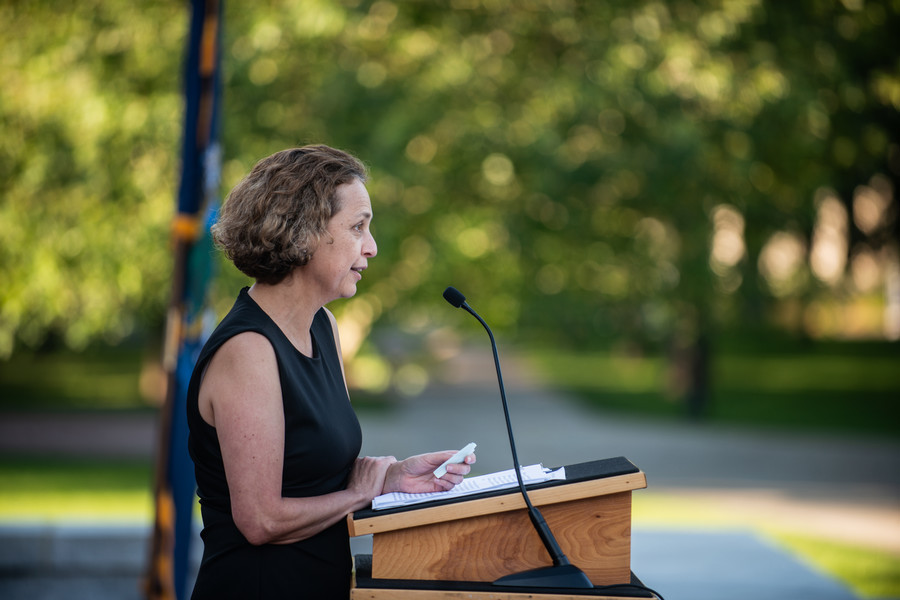Elephant in the Room: Mental Health Conversations at Bowdoin
By Bowdoin NewsDid you grow up talking about mental or emotional health?
So begins each of a series of personal conversations between Bowdoin staff members and Roland Mendiola from Counseling Services.
It has been—to put it lightly—a stressful year. In addition to the global pandemic, the recognition and repudiation of systemic racism and injustice, there was also the US election—oh, and keeping up with work on a campus that has adjusted to meet every possible challenge.
And so, just like people everywhere, the staff of Bowdoin College rode waves of tension, anxiety, and isolation. Job descriptions shifted wildly from March to November to meet the needs of a community committed to safety. The strength and support that staff members usually find in seeing one another on the Quad, in Thorne, or in the library, was difficult to replicate on Zoom—between bouts of home-schooling and scheduled COVID tests.
Roland Mendiola, interim director of counseling services, recognized that Bowdoin students (and others) could benefit from the opportunity to hear voices across the College on a more personal level—specifically exploring the intersection of mental/emotional health, social stigma, personal identity, and culture.
He began with a rough outline of five questions:
- Did you grow up talking about mental or emotional health?
- How do you think about those things now?
- How does who you are and where you're from inform that?
- I think we can consider mental health as one of the ongoing elephants in the room. What other kinds of elephants in the room feel salient to you, your life, or the world we live in today?
- From your own experience, what kind of message feels important for students to get about how to cope with the times we're living in today?
The conversations unfolded from that basic structure, often touching on the intersecting and overlapping roles of family, upbringing, faith, geography, gender, and growth.
Recordings of all of these conversations can be found on Bowdoin's YouTube channel, and they make for great listening just as much as great viewing.
So grab your headphones, head out for a walk, and realize that you are not alone in figuring out one of our biggest challenges: how we care for ourselves.
“To be able to say, I too feel helpless—that's so tough. It's hard work. It takes practice.”
Janie Porche from the Office of Communications about family pressure, washing boats, and whether all emotions are temporary.
“My upbringing and life experience up to a certain point had just said ignore it, move past it, push it aside.”
Tim Hanson from Safety and Security talks about coming to meditation as an adult, the importance of recognizing the humanity in one another... and Katamari Damacy, naturally.
“I've had to let go of the idea that I can be self-sufficient in all ways.”
Benje Douglas, Bowdoin's director of Title IX and Associate Vice President for Inclusion and Diversity, talks about the value of deep listening, asking for help, and acknowledging insecurities in the context of race, gender, and religious faith. Note that this interview is audio-only.
“You have to cultivate compassion for yourself, and forgiveness for the fact that you can't be in control of everything.”
CXD's executive director, Kristin Brennan, talks about how we treat others in times of crisis, and why we can't seem to treat ourselves the same way. She discusses issues of emotional expression, resilience, and social support, as well as the value of being a perpetual student of life and being real with ourselves and others.
“Growing up there was no conversation about the intersection of mental health and systems of oppression, poverty, or policy. It was just seen as personal failure.”
Eduardo Pazos, director of the Rachel Lord Center for Religious and Spiritual Life, speaks on his process of learning and understanding mental health issues through the lenses of religious upbringing, gender identity and expression, the immigrant experience, and Latinx values.
“As a Black woman, there is this dual experience of being both hyper-visible and invisible at the same time.”
Kyra Green, Assistant Dean of Admissions and Interim Director of the Student Center for Multicultural Life, talks about the role of family in her life; ways she has learned to prioritize herself and her well-being, and how Black Women can offer grace to themselves and each other, acknowledging how "it's okay to not be okay."
“I feel like a lot of us feel the pressure to hold ourselves to the standard of what our performance was pre-pandemic—as though everything is fine. And everything is not fine!”
Lisa Peterson ’07, Director of Gender Violence Prevention and Education, discusses her evolving experience and understanding of feminism and what it means to be a strong woman; issues of class and religion when it comes to emotional health; and how to practice humility and grace (for self and others) amidst varied public health crises.
“There's often a confidence and bravado in the athletic community, and that doesn't naturally lend itself to vulnerability.”
Tim Ryan ’98, the Ashmead White Director of Athletics at Bowdoin, talks about how some of the things we associate with athletics—including confidence, resilience, and practice—can intersect with mental health.
“When I had my first real strong episode with anxiety, I ended up kind of accidentally calling my dad. It's the best mistake I've ever made in my life.”
Sarah Seames, director of Bowdoin's McKeen Center for the Common Good, talks about how grief and anxiety moved her to a better understanding of mental health, and led her to join with other Bowdoin community members in a "grief group".
“It took some really dark periods in order to illuminate for me that depression was something I had been struggling with for 30-plus years.”
Michael Woodruff ’87, Director of the Bowdoin Outing Club, discusses how his arrival to Bowdoin as a student made him reconsider his beliefs, and how gender and upbringing defined his response to difference, anger, and treatment.
“I'm not saying that i want to be, like, the champion of hard conversations—but the more you allow yourself to have honest conversations, knowing that you want to think about the impact as well as the intention, you're always gonna come out of it so much more aware of who you are.”
Coach LJ Que, head coach of Bowdoin track and field, talks about her Filipino-American heritage, and the cultural and familial influences that inform her understanding of mental health—including the pressure to "always be grateful" and "not complain".



